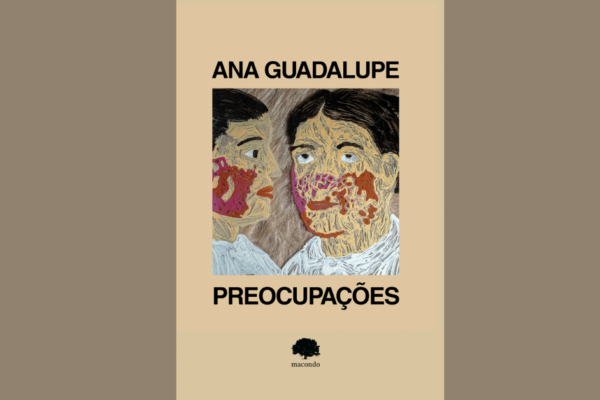She sat in the rocking chair on the patio to enjoy the coolness of the evening. The ferns hung still without a hint of breeze. Slowly it began to get dark. After a while her husband arrived home, complaining about the heat, the traffic and the meeting he had to attend at eight.
—How did you get in the house? she asked, seriously. He looked at her, curiously.
—How did I get in the house, the same as always, what a strange question to ask.
—And you opened the door yourself? she insisted with the same gravity.
—Of course not, the maid opened it. Something’s happened. What is it?
—I couldn’t open the door. The key wouldn’t fit.
—You must have had the wrong key.
—No, it’s the same one I’ve always used.
—Let’s eat, I’ve got a meeting at eight, he said impatiently from the dining room.
Deyanira, without thinking more of the incident, but without forgetting it either, continued her evening routine.
The following morning she was the first up as always. She made sure the children were ready by seven, the time the school bus came to collect them. When she had finished tidying up, she went to put on her blue low-heeled shoes and found they were too big. She didn’t often wear them but they were the shoes she preferred for walking. She tried the black ones, the brown ones, her tennis shoes, all were too big.
Her husband was shaving, concentrating on his image in the mirror.
—How peculiar, all my shoes are suddenly too big for me, she said in an uncertain tone of voice.
—What are you doing, little one? he asked, amused. Deyanira went back to the bedroom. She looked at the shoes she had tried on so many times.
—It’s incredible. she said in a low voice while she stuffed the toes of her blue shoes with cotton wool.
They ate breakfast in silence. Deyanira didn’t dare to talk about something that seemed so absurd, even though it disturbed her. They said goodbye with a kiss, and each left for work.
Deyanira walked gaudily, trying to cling with her toes to the slapping soles of her shoes.
As she left the bus her right shoe flew off at an angle and landed in the gutter. The dirty water soaked into the cotton wool. Now she limped as she dragged her shoe along to prevent it coming off again.
She breathed a sigh of relief as she reached the building of the company where she worked. As she neared her office she realised it was open – this was strange as she was the only one with the key. She opened the door and found a strange woman sitting at her desk, typing.
—Excuse me? she said.
—How can I help you? responded the woman, politely.
She hesitated, she had never coped well with the defense of her territory.
—Excuse me, she repeated, who are you? The woman continued smiling.
—Marta. Can I help you?
—And what are you doing here?
—I’m Julian’s personal secretary, she answered more seriously.
—That’s not possible. I’m Julian’s secretary, this is my office. It has been for six years…
—What are you talking about? Is this a joke? she answered angrily as she stood up.
The woman seemed to be talking seriously.
The only way out was to explain the facts.
—Look, I have been Julian’s secretary for six years. I don’t know what you’re trying to do. I don’t know if this is a joke. If it is then it’s in pretty bad taste. See, this is my desk, the vase, the photos of my children…
And Deyanira was silenced when she saw the photo of an attractive young man in the place where her two children, mounted in a frame, had once been.
—It’s Andres, my boyfriend. Added the woman, happily.
—But this can’t be. Let’s ask Elvira, the tea lady, who you are, or Sonia, the receptionist, or Julian…
—Look, you seem a bit mad to me. I’ve worked her for three years and I’ve never seen you in this office. I don’t know how you know the names of Elvira and Sonia, but all this seems very suspicious. Ah, that’s Julian arriving now; let’s see what he makes of all this.
Deyanira looked at Julian’s office. He would explain everything, wouldn’t he? And if he didn’t, what would she do? She sat on a chair, her eyes fixed on his door. She was a child waiting for an exam, or the dentist.
A tall man, Julian Vallejo, stopped in front of her. He looked at her curiously, and with more than a little insolence.
—Julian, whispered Deyanira.
—Good morning, he said, as if from a distance.
—Julian, she continued, this young woman says she is your secretary.
—That’s correct. Marta is my secretary.
—But Julian, I’m Deyanira, I’ve been your secretary for six years, I started working for you in the old building, before coming…
Julian’s features softened a little as he contemplated the anguish in her face.
—Listen, lady, you’re mistaken. I’m sure you’ve confused me with someone else. I don’t know you and, as far as I remember, you’ve never worked in this company. If I were you I’d go home and have a rest. Why don’t you see a doctor? Beneath his gaze she felt she wanted to cry.
Listen to me, young lady, go home and calm yourself. Julian turned away and returned to his brightly lit office. The secretary looked at Deyanira gently without any feelings of victory.
Deyanira got up, and dragging her right shoe as gracefully as she could, went out into the street.
Hanging onto the rail in the bus, she stared at a yellow stain on the window. She wasn’t thinking about anything except that it was impossible to think about nothing.
She got off the bus taking care not to lose a shoe. She had already walked some fifty metres when she realized she had got off at the wrong stop, her house was far away. She would have to walk back, up the hill for more than a kilometre. She was very tired. With each step fatigue slowed her down. She arrived at the railroad, and stayed there a long time looking at the rails. Yearning coagulated painfully in her brain; a piece of cotton in the midsummer heat of the afternoon.
The school bus arrived at the house at the same time she did. She saw her oldest son run towards the garden but her youngest was nowhere to be seen.
—Where’s Pablo? she called
The boy turned to look at her,
—Which Pablo? he replied.
—Your brother. Who else would it be?
—I haven’t got any brothers.
At that moment the front door of the house opened and the young boy ran in as quick as a flash. Deyanira stayed motionless in front of the maid who stood in the doorway staring at her with mistrust.
—What are you selling?
Another woman appeared beside her.
—Who is it, Dorita?
—I don’t know, she murmured, and went inside.
—What do you want? asked the woman, smiling.
Deyanira looked at her perfect teeth, her exotic hairstyle, her clear eyes. From apathy, just for the sake of enquiring, she asked,
—Who are you?
—Vera de Martinez.
—Luis Alberto’s wife?
—That’s right.
Deyanira turned round slowly and walked through the small garden looking at the ground.
A car stopped in front of the house and Luis Alberto Martinez got out in a hurry. From the pavement he saw a woman leaving his house. She was deep in thought, looking at her blue shoes. He watched closely as, with each step she took, she became paler and more transparent, until she disappeared.
Translated by Samantha Memi
El Eterno Transparente
Linda Berrón
Cuando quiso introducir la llave en la cerradura, comprobó sorprendida que no entraba. Trató nuevamente, pero no pudo. Probó con las demás llaves y tampoco. Observó con detenimiento la cerradura, ¿la habrían cambiado?, parecía la misma de siempre, como la puerta, como la casa. También la llave plateada y redonda era la misma. ¿Habrían tachado la cerradura?
Tocó el timbre con larga insistencia, dos, tres veces. La muchacha abrió, impaciente y mal encarada. Sin decir nada, dio medio vuelta y se fue a la cocina.
Todo parecía estar en su lugar. Guardó la llave en la cartera.
En el jardín, los niños jugaban con el perro. La tarde estaba soleada. Alejó la incertidumbre de sí y sea cercó a darles un beso. No le hicieron mucho caso.
Se sentó en la mecedora para disfrutar un rato dela frescura del corredor. Los helechos colgaban sin una gota de brisa.
Empezó a oscurecer lentamente. Al rato llegó su marido. Protestaba por el calor, las presas del tráfico y la reunión que tenía a las ocho de la noche.
—¿Cómo entraste a la casa?, preguntó seria.
Él la miró extrañado.
—¿Cómo voy a entrar?, como siempre. ¿Qué es esa pregunta tan rara?
—¿Abriste vos mismo la puerta? insistió con la misma gravedad.
— Claro que no. La muchacha me abrió. Oíme, ¿qué te sucede?
— Yo no pude abrir la puerta. La llave no entraba en la cerradura.
— Seguro era otra llave.
— No, era la misma de siempre.
—¿Comemos ya? Tengo una reunión a las ocho, le dijo desde el comedor.
Deyanira, sin pensar más en el incidente, pero sin olvidarlo tampoco, continuó con la rutina vespertina.
Al día siguiente por la mañana, se levantó la primera como de costumbre. Supervisó que los niños estuvieran listos a las siete, hora en que pasaba el microbús a recogerlos.
Cuando terminó de arreglarse, se fue a poner los zapatos azules de tacón bajo y comprobó que le que daban enormes. Se los calzó una y otra vez pero siempre se le salían al caminar. Se probó los negros, los marrones, los tenis. Todos le quedaban grandes.
Su marido se afeitaba concentrado en la imagen del espejo.
—¡Qué raro, todos los zapatos me quedan grandes de pronto! le dijo con tono inseguro.
—¿Te estás haciendo pequeña?, preguntó divertido.
Deyanira regresó al dormitorio. Miraba, perpleja, los pares de zapatos que se había probado repetidas veces.
— Es increíble, decía en voz baja mientras rellenaba las puntas de los zapatos azules con algodón.
Desayunaron en silencio. Deyanira no se atrevía a hablar de algo que parecía tan absurdo y sin embargo tan inquietante.
Se despidieron con un beso y cada uno marchó a su trabajo. Deyanira caminaba costosamente: trataba de aferrarse con los dedos contraídos a la suela bamboleante de los zapatos.
Al bajar del bus, el zapato derecho salió despedido y fue a parar al caño. El agua sucia empapó el algodón. Ahora cojeaba al arrastrar el zapato para que no se saliera.
Respiró aliviada cuando llegó al edificio de la empresa donde trabajaba. Al acercarse a su oficina, comprobó que estaba abierta. Se extrañó porque sólo ella tenía llave.
Abrió la puerta y se encontró en su escritorio aun a mujer desconocida que tecleaba la máquina de escribir.
— Disculpe, dijo.
—¿En qué le puedo servir?, respondió la mujer con excelentes modales.
Titubeó. Nunca se le había dado bien la defensa del territorio.
— Disculpe, repitió, ¿quién es usted? La mujer siguió sonriendo.
— Marta, para servirle.
—¿Y qué está haciendo aquí?
— Soy la secretaria personal de don Julián, respondió más seria.
— No es posible, la secretaria de don Julián soy yo, ésta es mi oficina, hace casi seis años…
—¿De qué está usted hablando? ¿Es una broma?, preguntó airada poniéndose de pie.
Aquella mujer parecía hablar en serio. No le quedaba más remedio que explicar lo evidente.
— Mire, yo he sido la secretaria de don Julián desde hace seis años. No sé lo que usted pretende, no sé si es una broma de mal gusto, vea, este es mi escritorio, el florero, la fotografía de mis hijos…
Y Deyanira enmudeció al ver la fotografía de un atractivo muchacho en el lugar donde habían estado sus dos hijos montados en un subibaja.
— Es Andrés, mi novio, añadió contundente la mujer.
— ¡Pero no puede ser! ¡Vamos a preguntarle a Elvira, la señora de la soda, o a Sonia, la recepcionista, o a don Julián, a quien usted quiera!
— Mire, me parece que usted está loca. Yo trabajo aquí desde hace tres años y nunca la he visto en esta oficina. No sé cómo se sabe los nombres de Elvira y Sonia, pero todo esto me parece sospechoso. Por dicha ya llegó don Julián, lo voy a llamar.
Deyanira miró la puerta de la oficina de don Julián. El lo explicaría todo.
¿O no? ¿Y si no lo hacía? Se sentó en una silla, los ojos fijos en aquella puerta. Era una niña esperando un examen, o al dentista.
Un hombre muy alto, don Julián Vallejo, se detuvo frente a ella, la mirada insolente y curiosa.
— Don Julián, murmuró Deyanira.
— Buenos días, señora, le dijo con distancia.
— Don Julián, continuó, esta joven dice que es su secretaria…
— Efectivamente, Marta es mi secretaria.
— Pero don Julián, yo soy Deyanira, he sido su secretaria desde hace seis años. Empecé a trabajar con usted en el edificio viejo, antes de pasarnos.
Las facciones de don Julián se suavizaron un momento al contemplar la angustia de aquel rostro.
— Mire, señora, usted está equivocada. Seguro me confunde con otra persona. Yo no la conozco a usted ni ha trabajado nunca en esta empresa que yo recuerde. ¿Por qué no se va a su casa y descansa? ¿Por qué no va al médico?
Bajó la mirada. Tenía unas ganas infinitas de llorar.
— Hágame caso, señora, váyase y tranquilícese.
Don Julián le dio la espalda y se perdió en la luminosa oficina. La secretaria la miraba sin triunfalismos. Deyanira se levantó y arrastrando el zapato derecho lo más airosamente que pudo, salió a la calle.
Colgando de la barra del autobús, permaneció con la mirada fija en una mancha amarillenta del vidrio. No pensaba nada, excepto que era imposible pensar nada.
Se bajó del autobús cuidando de no dejar perdido ningún zapato. Ya había caminado unos cincuenta metros cuando percibió que se había pasado de parada, que su casa quedaba muy lejos, que tendría que caminar cuesta arriba más de un kilómetro.
Estaba muy cansada. Con paso cada vez más lento y fatigado llegó a la vía del tren. Allí se detuvo largo rato mirando a lo lejos. La añoranza de los rieles cuajó dolorosamente en su cerebro, un algodón duro en el mediodía canicular.
El microbús escolar llegó a la casa al mismo tiempo que ella. Vio a su hijo mayor correr hacia el jardín pero no vio al pequeño.
—¿Qué se hizo Pablo?, le preguntó.
El niño se volvió a mirarla.
—¿Cuál Pablo?, contestó.
— Tu hermano, ¿quién va a ser?
— Yo no tengo hermanos.
La puerta de la casa se abrió en ese instante y el chiquillo se perdió en ella como una exhalación.
Deyanira quedó inmóvil frente a la muchacha que la miraba con desconfianza.
—¿Qué se le ofrece? Junto a ella apareció otra mujer.
—¿Quién es, Dorita?
— No sé, refunfuñó, y se fue.
—¿Qué desea?, preguntó sonriente la mujer. Deyanira miró sus dientes separados, su cabellera alborotada, sus ojos claros. Preguntó por preguntar, por pura inercia.
—¿Quién es usted?
— Vera de Martínez.
—¿La esposa de Luis Alberto Martínez?
— Así es.
Deyanira dio la vuelta despacio y atravesó el pequeño jardín mirando al suelo. Un automóvil se detuvo en ese momento frente al portón y Luis Alberto Martínez descendió apresurado. Desde la acera vio a una mujer que salía de su casa, la mirada ensimismada en sus zapatos azules.
Observó con atención que, a medida que avanzaba, se iba haciendo cada vez más pálida y transparente, hasta que desapareció.
https://www.facebook.com/lberron



